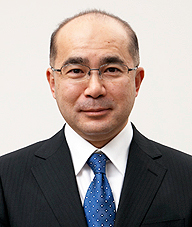Message from Director-General
|
|
October 31, 2017 Tomoyuki Higuchi
Director-General |
The information criterion known as Akaike Information Criterion (AIC) — proposed by the late Dr. Hirotugu Akaike, the 8th Director-General of The Institute of Statistical Mathematics, for the purpose of comparing statistical models — not only had a major impact on the field of statistics itself but also succeeded in establishing a certain style of research, aspiring to achieve intellectual gains through perpetual improvement of models, within a wide range of research disciplines.The 1974 paper, published in IEEE Australia Council (IEEE-AC), that introduced the philosophy of AIC provided a clear demonstration of its efficacy to the entire community, and to this day, over 40 years after its publication, the number of citations of this paper continues to grow each year. This shows that the full magnitude of achievements in statistical mathematics research can only be assessed with the benefit of many years (about 20 to 30 years) of hindsight, and that the influence of those achievements remains relevant long into the future. Indeed, citations to the paper in Web of Science (WoS) and Scopus, the two primary databases for journal papers, peaked in 2015. Perhaps this is because one typical way to use AIC is in selecting (explanatory) variables, and this has begun to be replaced by the modern techniques of sparse modeling and deep learning. Indeed, today, nearly half a century after the birth of AIC, I have a feeling that a new era has come to statistical mathematics.
It is at this turning point that I assume my final term as Director-General (a two-year term spanning FY2017 and FY2018). During my final term, I hope to strengthen three areas in particular: our research capabilities, our professional development facilities, and our collaboration with society. With operating support funds steadily shrinking year by year, and with increasing priority placed on developing and expanding the Corporation’s headquarters operations, it has become difficult to establish independent employment plans for our Institute itself. However, the imperatives of bringing together outstanding personnel to lead the research community, while simultaneously producing a steady stream of personnel capable of shouldering the challenges of the future, remains the most critical mission of us, as an Inter-University Research Institute. Thus, we will proceed with aggressive personnel recruiting; moreover, by reforming our core research organizations, we will establish a new organizational structure that abounds in the diversity and flexibility required to meet the needs of future generations. Indeed, the reform trajectory on which we have embarked has already had noticeable consequences: this fiscal year, we have employed five young assistant professors, and the share of full-time instructional positions occupied by women has grown from 4% to 18%, a significant improvement, during my tenure as Director-General.
Improving our professional development facilities is among the highest priority obligations that we owe to society at large. Within this fiscal year, the six national universities will each establish a center to promote education throughout the university basing the particular center related to mathematics and data science. In Japan, for many years it was the case that, aside from our Institute, no organization existed for the systematic study of statistics and other data sciences; we are extremely gratified that centers will be established to advance this important area of professional development. Whereas the six university centers address training at all levels, from intern-level trainees to independent practitioners, our Institute will develop professionals with the much advanced skills needed to lead their own project teams. As part of this initiative, at the end of the previous fiscal year, we signed the contract with the Center for Advanced Intelligence Project (AIP), RIKEN including offering rapid-study courses and developing educational materials for machine learning. In the area of industrial cooperation, we have continued to devote energy to several initiatives; including improving the Research Collaboration Start-up as a single unified consultation portal and setting up the Data Science Research Plaza, at which employed researchers belonging to private industrial companies can sit down to learn or conduct research. We hope to develop our cooperation with private sectors in ways that remain clearly visible to the outside world, including offering courses linking institutions at the organizational level and calling for relatively large-scale collaborative research projects with the private sector.
It was in April 2011, just after the Great East Japan Earthquake, that the Director-General’s baton was passed on to me from former Director-General Dr. Genshiro Kitagawa. In a time of great societal chaos and unrest, the fact that I, despite my inexperience, managed somehow to withstand the pressure of great expectations and respond to the needs of this position is due entirely to the advice and guidance that I received from my wise mentors, the strong support of the entire staff, and the assistance of the broader research communities. Going forward, I am committed to making the Institute an even better place, and one that makes even more valuable contributions to society, and I look forward to receiving your advice and guidance in this process.




